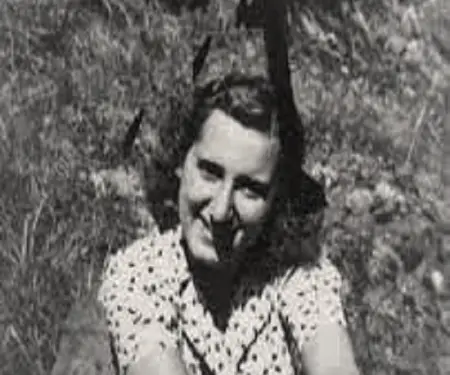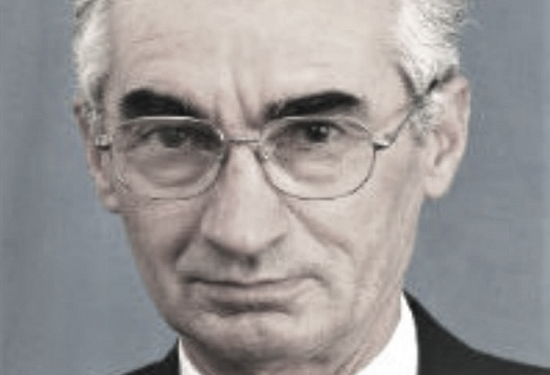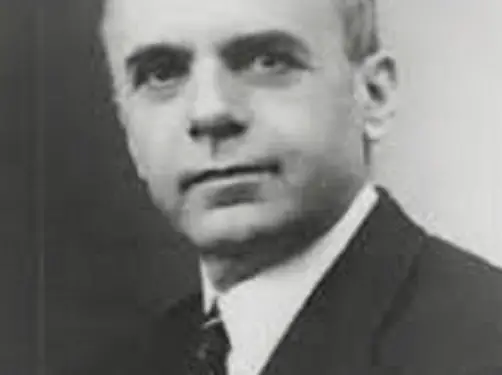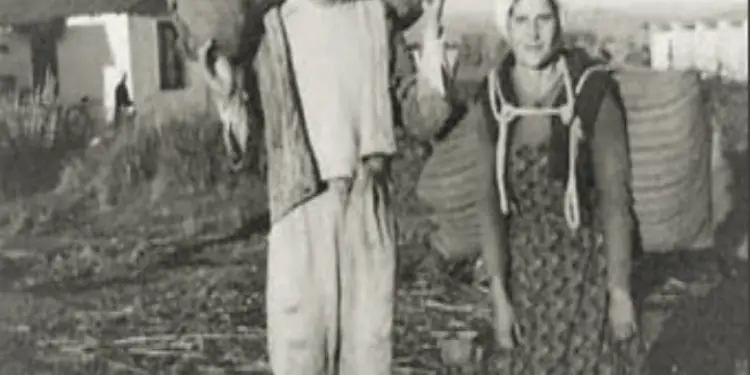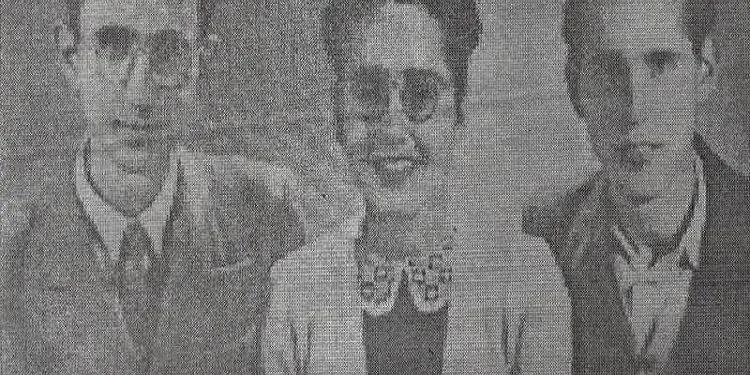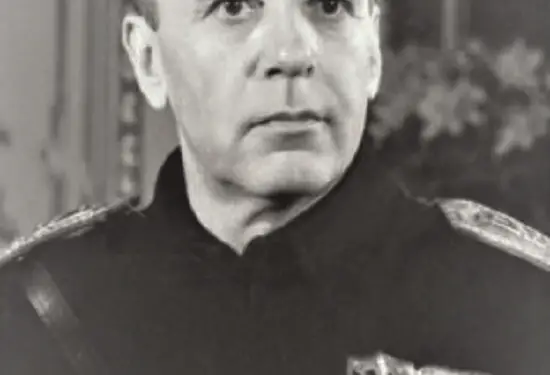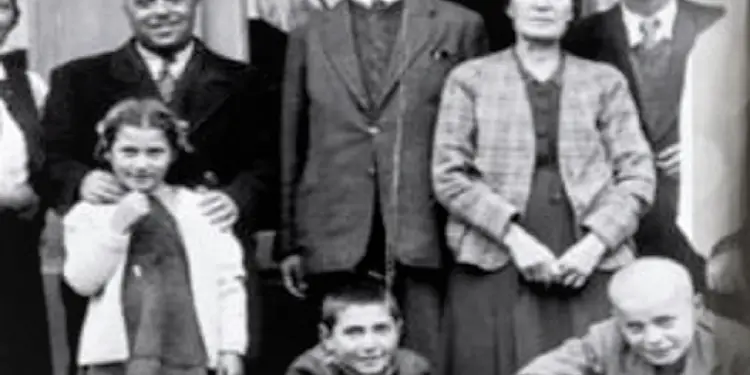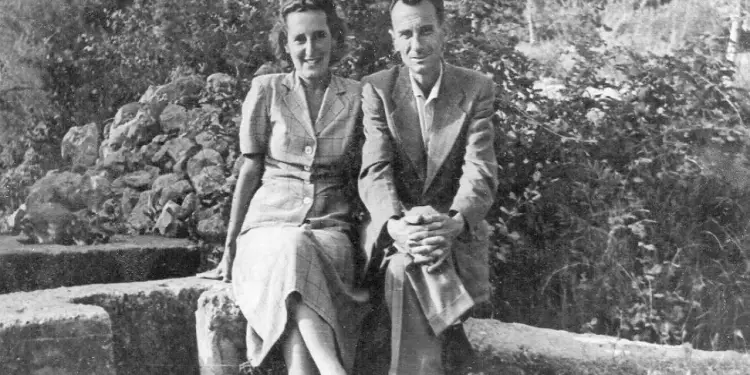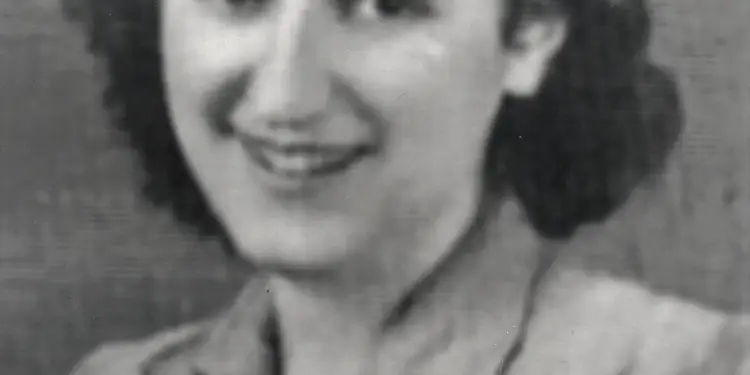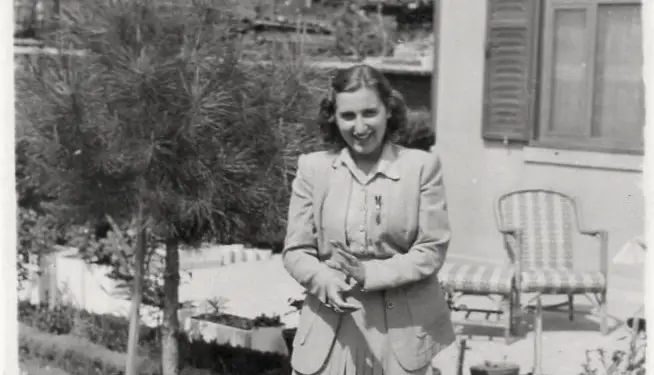By Eugjen Merlika
The fifth part
A life under dictatorship
Memories of a “class enemy”
Continued from the previous issue
Memorie.al/ I took the mother by the arm, we barely took her to a car that fortunately was close to the hospital and was going to Grabian. I was very sorry for him that he was in a serious condition, I was also very sorry for myself but, I felt sorry for the doctor. That good man, who tried to perform his duty with so much devotion and humanity, was obliged to obey the whims of an ignorant criminal, graduated in the army of the incompetent, but who, thanks to only a red ticket in his pocket, made the law. “Socialism is a war between the able and the disabled. Unfortunately in this war the latter win the most.” These words of Ismail Kadare were confirmed, in almost every step of the society that raised us and crippled us.
One can imagine his state of mind, his murdered personality, his dignity taken to zero. In another case later that doctor was reprimanded up to the Party Committee for visiting a patient with azotemia in Pluk, who had his days numbered. It was a little prolonged in this visit, trying to perform his duty more as a man than as a doctor, giving courage to the patient to keep him spiritually alive in the hope that science would do its miracle. It was a very humanitarian act: to remove at least the horrible image of the death of a woman at the age of forty-five, who had known in her life nothing but suffering. For this he received reprimands in the Party Committee, for he had trespassed in the house of the declassed, he had not respected the infamous code of class division. What a shame, how will future generations punish us because we put vileness and anti-humanism in the institution and on the pedestal…!
Yet Fatmir was not broken; he continued to serve his profession, despite the remarks, reprimands, injustices he encountered in every aspect of his work, and this is proven in hundreds upon hundreds of cases which everyday life put forward as evidence. He welcomes me and others like me, like people, like everyone else, gives us medical advice, and cares about the sick, despite the fact that someone may still not like this attitude. He has respect for suffering, for human pain, but not just as a doctor, but also as a person, as a citizen, as an Albanian. May God have enough such people, because they are a necessary condition for the spiritual revival of this seriously ill nation?
The second time the mother was taken to the hospital emergency room, always with the permission of the People’s Council with a severe heart attack. The specialist doctor was not there and the patient stayed all day without being admitted to the ward, and only in the evening, a doctor I knew, took the responsibility to temporarily place her in it. I returned at night on foot, a total of 18 km. track, after I signed the permit in the Internal Affairs Branch, to deliver it here to the person in charge of the police duty. Two days later, I was called again to get my mother out of the hospital. I am not a doctor, I do not have deep knowledge in medicine, but I believe that there would be no doctor in the world who would agree to discharge a patient with a heart attack after seventy-two hours. Here, in this procedure, the laws of medicine were not respected but, the Security orders that people infected with the dogma of the class war were transmitted through the canals to the hospital wards, to be implemented by their counterparts in white T-shirts.
A general problem in all these long years of internment remained for us the issue of housing. I do not remember in my whole life to have had a house however modest, but enough. In Grabian we were given a room and an annex on the second floor, no kitchen, and no bathroom, no place where a drop of water could be poured. We cooked outside in the rain and sun, while bathing at the bottom of the stairs, in a hallway five meters high. Take into account the necessary personal problems of the sick man, the old man, the children, and the woman with a toilet that was on the street twenty – thirty meters away from the door of the apartment…! Such primitive inconvenience conditions are unimaginable for a citizen of the computer world; perhaps many will not believe them. Thankfully the truth is alive and anyone can attest to it with their own eyes if they take the trouble to visit Grabian.
These two-storey houses designed in Bulgaria for agricultural families were calculated for one family, up and down. But the “People’s” Power Party thought that the large space in the apartment could cultivate bourgeois individualism, with all its harmful consequences, in the formation of the young man. Therefore, people had to be kept as close to each other as possible, so that the “unity” around the Party was greater…! So two families entered an entrance, with all the consequences that a good part, not only of the internees, but also of many free citizens, enjoyed themselves. In the Gradisht sector, my uncle, for years, had turned the single window of the single room into a door. A pair of stairs from the outside and inside served to enter and exit. There one night, the desolate grandmother fell and broke her arm. In this way the housing requirements were met in a country where the villas of the leaders are proverbial, where forty million dollars are spent for a museum and where billions of ALL is buried in the ground in the shape of domes…!
In my family conditions in those years, I solved the problem of sleeping by building two wooden beds with two floors, where the two little girls slept and the mother with the father. So I turned the house into a military barracks, putting into action the famous slogan “All the people are soldiers.” The chairwoman of the People’s Council, “friend” Nurie, a concentrated personification of human evil, responded negatively to the repeated request to build a kitchen with reeds and mud in front of the house, under the pretext that the appearance of the palace was deteriorating, while the “lady” herself changed the entrance every time a new palace was built. The chairwoman of the Joint Council, who knew us from Pluk, had finally been found, that I had had a brigadier, who gave the long-awaited order to build a hut that would serve as a kitchen and a place for cooking and sleeping for parents. This is how the housing problem in Grabjan was solved.
Life in exile in the 1980s was a real torture. For any need, to get out of the sector, you had to get permission from the Internal Affairs Branch, and you even had to be accompanied by the police, even when you were going to the doctor. To my uncle who lived in the Gradisht sector, an hour and a half away, I could not go to visit even once in six years! I went to the woman’s family twice to visit, once when my father-in-law was ill and the second time he died. As per the regulation that was read to us from time to time, only for the death of relatives, or for a medical visit to the specialist, permission could be given. This was Ramizian “continuity”, the springboard from which we would jump towards Europe.
Even heavier than the regulations was the terrifying atmosphere that weighed on us for years. We were the shooting table at any meeting, a gogol held to the feet to scare the birds from eating the seed. In the eyes of the common people, we were served as the worst people, the enemies, those who tried to overthrow the popular power, those who do not love the Party and Enver Hoxha, those who can poison water tanks, can put them fire stables or fields, those who can sabotage production, cutting plants during their threshing, who can dry plants by flooding with water, who can … and this could go on indefinitely, proving the “eloquence” of the cadres of The party that preached these things. Thus to most who did not think for themselves, but blindly believed for one reason or another party propaganda, hatred was created which then appeared in many directions.
She expressed in complete isolation, no one dared to enter and leave the house for any occasion, misfortune or joy, and there are still communists who do not even tell us good morning, even though we have been living in the same neighborhood for over ten years. Even on the field, when we sat down to eat lunch, we should not be next to each other. Every word of ours was misinterpreted and reported to the Security operative or the Party secretary, who rushed to pass it “up”. Surveillance was uninterrupted, in various forms and at every moment; there were also various provocations from brigadiers or people in charge of these tasks. To be objective, I must say that not all cadres and communists zealously embraced and applied these methods and messages. To their honesty and correctness, we must give the merit that belongs to them with the satisfaction that comes from the thought that not everyone morally denigrated and became the levers of dictatorship.
Class warfare and police terror took on their highest tones in the so-called “political unmasking”, which from time to time, depending on the political situation of the country, were organized by the District Party Committee in cooperation, or rather with orientation of the Branch of Internal Affairs. In these unmasking meetings, everyone was forced to go. Their procedure was stereotypical. The meeting was opened by the party secretary of the sector, who gave the floor to the delegate of the District Party Committee, who began his presentation. These were exhausting moments for all of us, because we knew that from one moment to the next, our name could be called to appear in front of the hall. It was as if an invisible sword were swinging from unknown hands over the heads of all the “declassed”, to strike one or the other. Who was next? All of us with frozen hearts were like those roulette players who, waiting on what number the fugue will stop its movement. This devilish maneuver was the tactic of the meeting leaders. After uttering a few phrases on the work of the season and the “great successes of the people under the leadership of the Party,” the delegate approached the anxious moment when he discovered that x or y, were in our ranks, enemies and people trying to “vomit or t ‘ they opposed the revolutionary atmosphere that prevailed …”!
I feel defiled, now that I am writing these lines, remembering those infamous meetings, one of the dirtiest and most barbaric inventions of the organs of violence, the most flagrant violations of human personality and human rights. As soon as his name was called, the poor man had to go out in front of the full hall and stand for hours. Then began the indictment based entirely on the lies of the spies or the conjecture of the officers of the Home Branch. These were served in party attire, defending their authenticity with the stale phrase: “Is the Party lying?”, Another open provocation of the power machine against the vulnerable individual. , came until the last days with the words or actions of the defendant, began the barrage of discussions by the people represented here by some lowly people, without character and servile.
It is interesting that in all these unmasking’s, in which I participated without falling on my head personally, I have always seen almost the same people speaking, certainly treated and indoctrinated by their masters. The motives of their actions must be sought in many causes, material benefits or coverage of malicious activity, unscrupulous careerism and party fanaticism, ignorance and sadism. In their vocabulary were revealed all: loyalty to the Party and Enver Hoxha; the courtroom roared with applause, forcing them to join and the defendant standing. Slander, ridicule, curses, proposals for transfers to remote mountainous areas, trials, beatings, spitting, and even capital punishment continued. But here the delegate or secretary intervened, who as representatives of the “generosity” of the Party, clarified that the will of the masses of the people was above all, but that the Party did not want to punish people, but to “educate”.
Beautiful education, what a cruel phrase shamelessly played on ordinary Albanians! There have been times when it has gone too far into the unimaginable and unbelievable for a citizen of today’s Europe. The Tase family, after such an unmasking, just because one of its members did not clap their hands for Enver Hoxha, was stoned by all those people, children and adults. A biblical scene that went on long enough, a battle between enraged mobs of a wise family, a stain of shame on the conscience of that population that was present in those scenes without reacting at all, a shocking example of the extremism of the red dictatorship institutions in Albania. These were some of the painful aspects of the years of internment until 1990, when democratization abolished this practice, ugly and unnecessary, as well as unfair and illegal in legal terms.
Arbitrariness and violence, this was the real face that the Albanian Socialist State showed to us for decades…! This was the past we held on our shoulders since we were born until now when our hair turned white and life began to decline towards the inevitable end. Was this attitude right, does anyone take responsibility for our ruined life, for our physical and spiritual mutilation, consequence of this life; can he understand in all its dimensions our tragedy of civilized Europe? What can be done for us who lost so much in this unequal war with a monstrous machine that cruelly trampled on our dreams and illusions about life, this great gift of the Creator? Will there be comfort and renewal for us who were transformed into living corpses, without owing anyone, not a single hair? Will there be room for us in a society that is said to be being rebuilt and in a world that aims for the good, for the eradication of dictatorships?
Dozens of questions mercilessly strike the weary brain that seeks tranquility at this moment the balance sways in the mirage of the future, where the beautiful tree of hope springs up that my children will not suffer in life what I suffered.
Grabian, June 1991
THE MIND OF THE FREE MAN
(Discussion at the National Conference on Literature, March 1996)
I find it very useful to organize this conference, at a very high level, on a topic so important for the present and future of Albanian culture, such as the topic of literary heritage.
Professor Sabri Hamiti rightly called our literature intentional literature. The historical conditions of our country forced the Albanian writers, at different times, from the beginning to the present day, to condition their works with the needs of the moment and the future of the Nation. The heavy burden of forming the national consciousness fell on the writers who had to be teachers and historians, spiritual leaders and politicians, genuine poets and prose writers and translators, patriotic activists and, in many cases, rulers…! It seems to me this special specificity of Albanian literature that complicates the work of the literary critic or compiler of Albanian literature, who in these cases must separate the servant of the temple of letters from the rest of his personality.
It is precisely the study, seen in this prism that will be the basis for compiling an objective literary history or, for a revision of that history. How important is the role of objective criticism, without prejudice of any kind, in this process is superfluous to assert. The problem that, in my humble opinion, lies before us today is another: are we able to make this objective assessment? Fifty years of extreme dictatorial system have deeply indoctrinated us, even unconsciously, with communist and anti-communist principles, so much so that it seems very difficult to me to be objective. It takes the mindset of the free man from the chains of ideologies, with a rich baggage of ideas and universal principles of art evaluation to accomplish this mission. We must practice the criteria of appreciation of great art, which has stood the test of time because, in all its performances, it has centered on man, the “crown of living things,” as Shakespeare called his inner mini-universe with all its complexes of psychological, moral, intellectual, material order, its relations with the like, with the world around it, with all its written and unwritten laws.
Thus come to us from the depths of the centuries the wrath of Achilles and the loyalty of Penelope, the vengeance of Medea and the passion of Paolo and Francesca, the jealousy of Othello and the murdered sleep of Macbeth, the naive altruism of Don Quixote and the loving sighs of Heloiza Faust for a moment of happiness and Karl Mori’s rebellion, Raskolnikov’s criminal composure and Andrea Bolkonsky’s spiritual nobility, the Trinity pain or the poet’s blindness in the siege of Kruja. This should be the measure by which our writers, old and new, should be measured. With this mindset, it is important to educate the new generation of pupils, students and young scholars of literature. It seems to me important, in view of this idea, the need to translate and make available to the readers the works of the great critics of classical and contemporary world literature.
The rewriting of the history of Albanian literature, far from the absurd parameters of the fifty years of the communist regime, will be one of the main manifestations of the renewal of the spiritual culture of our people. The long storm we went through not only flattened the economy, but also truncated our inner world, raising cults of anti-values and denying not only the values but also the lives of their bearers. It is our imperative duty to be reborn, to be resurrected, to put in the right place what was unjustly displaced and to re-evaluate impartially what has been overestimated, also unjustly. The beginning is good, but there is still a lot to do, because we have to re-evaluate with the composure of a scientist, without passions, because these are not good advisors. Then let us hope that the new generation of writers, who will be lucky enough to live in a normal Albania, will have the ability to further elevate the temple of Albanian letters. /Memorie.al
March 1996




